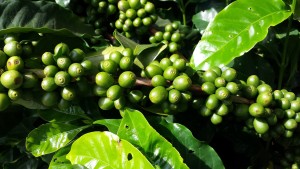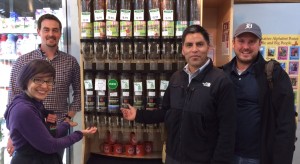By Laura Coffee, Marketing & Owner Services Manager, Co-op Owner
Everything comes from somewhere.
The apple in your lunch may have come from the tree in your backyard, or been shipped across the country from Washington state. The clothes you’re wearing could be hand-made by someone you know, or carried around the globe in planes, trains, and automobiles. Perhaps it’s something in-between. But unless you have your own year-round greenhouse, you aren’t growing coffee in Michigan. When something is as ubiquitous as coffee, it can be easy to forget that it has an origin beyond your local grocery store, but it does, and that origin is a story worth hearing.

To begin with, we have to remember that coffee is actually a seed found inside the fruit of the coffee plant. Like most food crops, coffee is actively cultivated by farmers in order to ensure an adequate supply. The majority of these coffee farmers live in South America. A native of Africa, the coffee plant was first cultivated in South America in the mid-1700s. At first, and for a long time afterwards, the plants were grown on European plantations and tended by indentured indigenous people. Though a lot of coffee is still grown on plantations, some of the native peoples have been able to form collectives and sell their coffee directly to distributors here in the United States. That’s where Higher Grounds comes in.
Higher Grounds is a Michigan coffee roaster that forms direct relationships with the farmers who grow their coffee. Here’s what they have to say about those relationships:
“We believe that the finest coffees are grown by the best of friends. That’s right, friends: we visit the farms; we meet with growers—even if that means traveling dirt roads, past washed-out bridges, through riverbeds, and up mountainsides. We drink coffee together, talking about the best ways to keep their farms sustainable and profitable. But you’re a business! you might say. Don’t you want to keep yourself sustainable & profitable? Well, sure. But we’re not so worried about ourselves. Our friends in coffee-growing regions have long struggled to stay afloat—small-scale coffee farming isn’t exactly a lucrative livelihood. Coffee farmers put in countless hours for an average yearly income of less than $300: that’s less than 2% of what a full-time worker on minimum wage in the U.S. makes in a year, & pocket change compared to what many of us spend per year on coffee alone.”
So when we were offered to opportunity to help sponsor a visit to Mt. Pleasant from representatives of Higher Grounds and one of their coffee farmers, we jumped at the chance.

The farmer’s name is José Perez Vasquez. In addition to growing coffee, he is a peace activist, a father, and a Mayan from the Mexican state of Chiapas. During the hour long presentation, translated by Higher Grounds Co-founder and Director Chris Treter, Jose talked about many things. We learned about the rampant spread of coffee rust, exacerbated by climate change, that has been killing as much as 40% of each year’s crops. While the government provides support for the large plantation coffee growers, it does not do so for the small farms of native growers, and is often hostile toward these groups. We learned about the Acteal Massacre (Be aware that this is disturbing information.), and the formation of the cooperative Maya Vinic coffee growers collective.
While much of the information José shared told of how difficult the life of an indigenous coffee farmer is, it was also inspiring. In the face of so much social and economic hardship, these people have banded together to create a better life. They work to improve their communities, provide education and opportunities for their children, and safeguard their language and culture.
 After the presentation those in attendance stayed to discuss the talk and the broader social and environmental issues it addressed. José’s native language is a regional Mayan dialect that I can, unfortunately, neither spell nor pronounce, let alone speak. Fortunately, he is bilingual and also speaks Spanish. My Spanish is very poor, but with Chris Treter’s help we were able to have a short conversation. We did not speak for long, but this is what I can tell you about José: He is an earnest man who cares very much about the well-being of those around him. He is humble, telling us that he did not deserve the privilege of addressing us about these issues. He is brave, traveling a long way to a place where he does not speak the language to share the story of his community. And he is generous. After we talked he presented me with with a hand-embroidered bookmark produced by the women’s collective to which his wife belongs. This was a gift from a man who likely makes less in a year than most of us do in a few weeks.
After the presentation those in attendance stayed to discuss the talk and the broader social and environmental issues it addressed. José’s native language is a regional Mayan dialect that I can, unfortunately, neither spell nor pronounce, let alone speak. Fortunately, he is bilingual and also speaks Spanish. My Spanish is very poor, but with Chris Treter’s help we were able to have a short conversation. We did not speak for long, but this is what I can tell you about José: He is an earnest man who cares very much about the well-being of those around him. He is humble, telling us that he did not deserve the privilege of addressing us about these issues. He is brave, traveling a long way to a place where he does not speak the language to share the story of his community. And he is generous. After we talked he presented me with with a hand-embroidered bookmark produced by the women’s collective to which his wife belongs. This was a gift from a man who likely makes less in a year than most of us do in a few weeks.
Like I said, everything comes from somewhere. Higher Grounds coffee comes from a group of hardworking people who struggle against heavy odds to create something wonderful that we, over 1000 miles away, can enjoy. And when we choose responsibly sourced coffees like these, we can know that each cup improves the life of a person like José. Someone with a family, a community, a story to tell… And that is no small thing.

